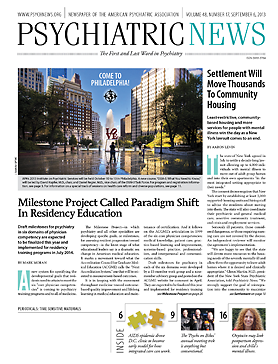A patient’s positive regard for psychotic symptoms—the sense of being powerful, important, or a “different person” that symptoms may lend a patient, or the feeling of “missing” voices when receiving medication—may contribute to nonadherence to antipsychotic medication.
That was the finding from a study by German researchers looking at reasons for nonadherence to medication regimens in the July Schizophrenia Bulletin.
They found that most patients listed as reasons for nonadherence the “usual suspects”: intolerable side effects, poor insight into the nature of illness, rejection of medication generally, and distrust of the prescriber—but a substantial number of patients also endorsed feelings of positive regard for symptoms.
A significant percentage affirmed that taking medication would feel the same as acknowledging that all they had experienced was untrue. “Many patients with schizophrenia have endured negative life events such as neglect and abuse,” lead author Steffan Moritz, M.D., and colleagues at the University Medical Center, Hamburg-Eppendorf, wrote. “For these patients, a medication prescription without complementary psychotherapeutic assistance may create the impression that these incidences are deemed irrelevant.”
They added that some patients have a strong need to give a subjective meaning to their psychosis. “If this subjective meaning of illness is overlooked by clinicians, nonadherence to medication might be a consequence,” they said. “The subjective illness concept, specifically the question whether a mental condition is considered an illness or a partly desired state, seems very relevant to treatment-seeking behavior and compliance. This question has so far been often neglected in studies of medication compliance in schizophrenia, presumably due to the fact that the disadvantages of psychosis largely overshadow any subjective advantages in patients seeking psychiatric treatment.”
Moritz and colleagues posted invitations for participation on several moderated German online discussion forums focused on psychosis, and a Web link provided access to an anonymous Internet questionnaire. The questionnaire gathered data on sociodemographic and background information (age, gender, and occupational status), diagnosis, and medical history. Participants were also asked to specify type and dose of medications that they were prescribed.
Attitudes toward antipsychotic medication were assessed on a 5-point scale ranging from “refuse intake” (no compliance) to “medication helps me, and I take them on a regular basis” (full compliance). Subsequently, patients were asked whether they had ever discontinued their medication or not taken it as prescribed; if noncompliance was affirmed, the patient was asked to specify the reasons.
A total of 113 patients with a likely diagnosis of schizophrenia and a history of antipsychotic treatment were retained for the final analyses.
Eighteen percent of the sample endorsed the following statement: “During psychosis, I had a feeling of importance and power which I did not want to miss.” A similar percentage endorsed this statement: “During my illness, I become another person, and for this reason I need this state from time to time.”
Seven percent of the sample said they discontinued medication because they “missed the voices.”
Not surprisingly, side effects were the most commonly endorsed reason for stopping medication, with 80 percent of the sample giving that as a reason. This was followed by a belief that medication was unnecessary (58 percent), stigma associated with taking medication (31 percent), and distrust of the prescribing clinician (31 percent).
Other reasons for noncompliance included rejection of medication in general, forgetfulness, “friends/relatives advised me not to take it,” medications “do not work for me,” “I falsely assumed that I should take them only when having acute symptoms,” and “medication is too expensive for long-term treatment.”
William Carpenter, M.D., editor of Schizophrenia Bulletin and chair of the DSM-5 Work Group on Psychotic Disorders, said some expression of positive regard for psychotic symptoms is not rare in clinical practice. He described patients who spoke of the voices they heard as comforting and a woman who recalled a lonely and isolated childhood who spoke of her voices as a companion.
He recalled years ago treating a patient in a hospital who would stand by a window and stare at the sun when he was on medication and his hallucinations abated. “He said the only way he could get his hallucinations back was to stare at the sun,” Carpenter said.
“It’s not always so that voices and hallucinations are frightening, unwelcome, or stressful to patients,” Carpenter told Psychiatric News.
Moritz and colleagues stressed the need for clinicians to assess patients’ feelings about their symptoms and about medication and to plan treatment accordingly. “Our findings suggest that greater consideration of the possible positive effects of psychotic symptoms and the subjective illness model of the patient is needed in order to formulate an optimal hierarchy of target symptoms,” they said. “Psychotherapy and psychoeducation might be of particular importance in challenging dysfunctional beliefs about the disorder and its treatment, while cognitive remediation might be useful for tackling forgetfulness as a reason for noncompliance.” ■
